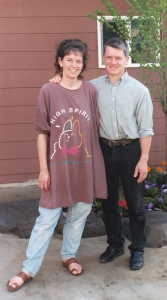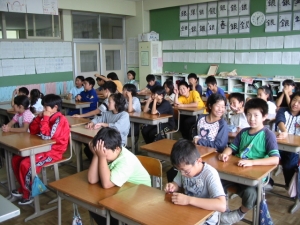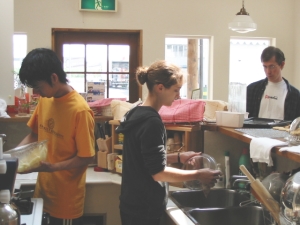What Do Missionaries Do?
 Martin and Ruth Ghent
|
Mostly, they live like the rest of us. They spend most of their day at work, and then cook, clean, and spend time with their family and friends. There is a slight difference since most missionaries (in Japan, at least) are also pastors, so their work is for God, but a lot of it is mundane church work (preparing the bulletin, repairs, staff meetings, etc.) They are not always in a spiritual discussion with someone, although that certainly does happen. The difference from most of us is their focus.
 Hiraka Elementary School (Courtesy David Kim) |
 Kazuki, Hannah, and the author working in the Cafe. (Courtesy David Kim) |
So what ordinary, “non-ministry” sorts of things did we do? In the mornings when we weren’t in Kanagi, Hannah usually helped Mrs. Ghent cook the day’s food for the church cafe. Tuesday mornings we generally did some sort of mundane church work (cleaning, stamping papers with addresses, etc.). Thursday early afternoon was usually resting and preparing snacks for the Hiraka English classes. Fridays and Saturdays we generally helped with church tasks, cleaning, preparing for events, moving chairs, paperwork, etc. Mondays were our free days; most of us rested, while I did some sight-seeing.
Maybe only about half our time was spent in “ministry”. By the time we travelled back and forth to the villages, we usually spent about four hours a day Tuesday and Wednesday (two on Thursday) doing tracting. We taught English from 4 - 7 pm on Thursday. Friday evening was often a church program that we attended and/or helped out with. Saturday evening was the Cafe Meeting where seekers (and the Christian youth) who were introduced through the cafe came. Sunday was busy: an English class in the morning, attending the services at Itayangi in the morning and Kanagi in the afternoon, and the English service in the evening. We also spent a weekend with the English service retreat, a weekend teaching English at the church retreat, and most of a week doing the children’s program for the yearly OMF Japan Conference.